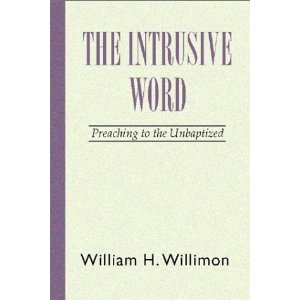 In Will Willimon’s outstanding book on preaching, The Intrusive Word: Preaching to the Unbaptized, he mentions a distinction that John Crossan (in his book The Dark Interval) makes between myth and parable. Willimon sums up Crossan’s view like this,
In Will Willimon’s outstanding book on preaching, The Intrusive Word: Preaching to the Unbaptized, he mentions a distinction that John Crossan (in his book The Dark Interval) makes between myth and parable. Willimon sums up Crossan’s view like this,
“Myth attempts to mediate opposites, explain mystery, reconcile polarities, to take the randomness of life and weave it into a believable pattern. In myth, bad guys get what they deserve, and the good are rewarded. Through myth, there are explanations for the apparent incongruities of life, reasons given by the gods.
Why is there evil in the world? Well, this woman, Pandora, you know how nosey women are, wouldn’t stay in her place, opened the mysterious box, and evil and heartache were unleashed on the world. That’s why there is evil in the world. Any more questions? Myth explains, settles, closes the gaps in our consciousness.
Crossan says myth’s polar opposite is parable. ‘Parable brings not peace but the sword…parable casts fire upon the earth.’…Parable is meant to change us, not reassure us. Parable is always a somewhat unnerving experience. The standard reaction to parable is, ‘I don’t know what you mean by that story, but I’m certain I don’t like it.'” (p.64-65)
He goes on to say that myth attempts to reconcile seemingly unrelated and incongruent things, while parables hope to “create contradiction within our complacent securities.” (p.65). What he means by that is that parables challenge the world as we know it while myth attempts to explain what we see and offer no real alternatives. Myth aims to make you feel settled. Parable aims to upset and provoke you to change by challenging the very structures and schemas that make up your thoughts, values and identity.
What does all this have to do with preaching? Williman says that us preacher types love myth more than we love parable. We love to fill in gaps with what we do know and avoid awkward gaps in our knowledge and experience whenever possible. It can be a prideful way of doing things to not recognize the humility that comes with recognizing just how much we don’t know, just how little we can do on our own, and just how much we really do rely on God and not our own ability to systematize away the theological gaps that our preaching can get easily upended by but we creatively weave our way around. We don’t like to be unsettled but Williman’s point is, that is exactly what the Gospel is supposed to do. We grow up thinking the Gospel is about settling us with answers but far too often those answers are too in tune with the world and not in tune enough with God.
I don’t know about you but I needed to hear that. I like being the answer man. Being an authority on things seems like a pretty sweet gig until you read Willimon and realize that we are all small potatoes. If you preach you really need to read this book because no matter what your approach is you will find something in this book that will offend you enough to make you a better preacher.








0 Responses
That is a powerful statement, Matt. This is a good distinction between ‘myth’ and ‘parable.’ A parable drives us deeper into life. A myth answers our questions – but how accurate those answers are are seldom considered.
While I see some parallels between the Genesis account of the Fall and the myth of Pandora’s box, the story of the Fall helps explain how we got into the mess we’re in – but it also points to redemption. Pandora slammed the lid to the box shut before the one ingredient that was redemptive could get out: that was hope. Even when God explains evil, He gives hope. The myth does not. (Not that Eve’s story is a parable!)
Parables convict us. They reveal God to us, but with open-ended invitation to ponder the truths underlying the parable.
This is very informative and educational spiritual-wise.The Word of God says that God is not the author of confusion so that leaves you know who behind this book.Plus we know that our enemies are SPIRITUAL not physical.
1 Corinthians 2:14 says:”But the natural man does not receive the things of the Spirit of God,for they are foolishness to him;nor can he know them,because they are spiritually discerned.
Since carnal men are spiritually unable to grasp and understand spiritual truth,they are easily blinded by Satan to the truth,which is in Jesus,the WAY,the TRUTH,and the LIFE.